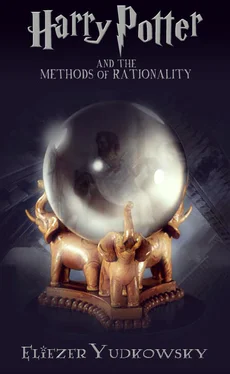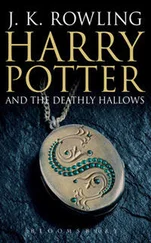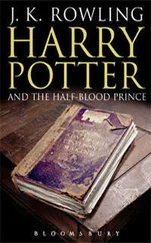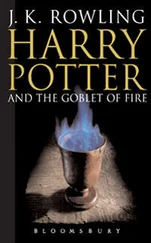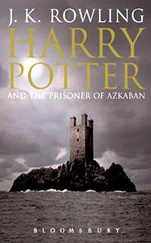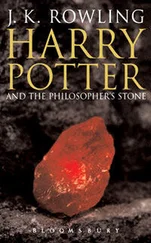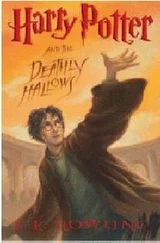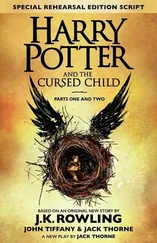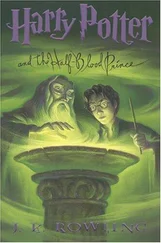“P-Professor Quirrell? What are you doing here?”
“Well,” the man in the black cloak said thoughtfully, “ you needed to fly into a rage and have a loud tantrum in the Forbidden Forest in the middle of the night, and I needed to go just outside your ability to detect me and keep watch. One does not leave a student alone in the Forbidden Forest.
That should be obvious in retrospect.” Harry stared at the fallen centaur.
The horse-form wasn’t breathing.
“You—you killed him, that was Avada Kedavra—”
“I do not always understand how other people imagine morality to work, Mr. Potter. But even I know that on conventional morality, it is acceptable to kill nonhuman creatures which are about to slay a wizard child. Perhaps you do not care about the nonhuman part, but he was about to kill you. He was hardly innocent—”
The Defense Professor stopped, looking at Harry, who had raised one trembling hand to his mouth.
“Well,” the Defense Professor said then, “I have made my point, and you may think on it. Centaur spears can block many spells, but no one tries to block if they see that the spell is a certain shade of green. For this purpose it is useful to know some green stunning hexes. Really, Mr. Potter, you should understand by now how I operate.”
The Defense Professor came nearer the centaur’s body, and Harry took an involuntary step back, then another, at the terrible rising sense of STOP, DON’T—
The Defense Professor kneeled and pressed his wand to the centaur’s head.
The wand stayed there for a time.
And the centaur rose, eyes blank, breathing once more.
“Remember nothing of this time,” the Defense Professor commanded. “Wander away and forget everything about this night.”
The centaur walked away, the four horse-legs moving in strange synchrony.
“Happy now?” the Defense Professor said, sounding rather sardonic about it.
Harry’s brain still felt broken. “He was trying to kill me.”
“Oh, for Merlin’s sake—yes, he was trying to kill you. Get used to it.
Only boring people never have that experience.”
Harry’s voice emerged, hoarse. “Why—why did he want to—”
“Any number of reasons. I would be lying if I said I’d never considered killing you myself.”
Harry stared at where the centaur had wandered into the trees.
His brain still felt half-broken, like an engine misfiring, but Harry did not see how this could possibly be a good sign.
The news of Draco Malfoy nearly being eaten by a horror had been sufficient to summon back Dumbledore from wherever he’d gone, to wake Lord Malfoy and the Lady Greengrass’s handsome husband, to bring forth Amelia Bones. The supposed presence of the horror had provoked skepticism even from Dumbledore, and the possibility of False Memory Charms had been raised. Harry had said (after some internal debate about the consequences of people believing a demon was on the loose) that he didn’t actually remember making the same effort he’d put forth to frighten the Dementor, the dark thing had just left; which was what you would expect someone to create as a False Memory, if they hadn’t actually known how Harry had done it. The names of Bellatrix Black, Severus Snape, and Quirinus Quirrell had been mentioned in connection with wizards strong enough to subdue everyone present and cast False Memory Charms, and Harry had known that Lucius was thinking of Dumbledore. There had been Aurors testifying, and discussions going in circles, and glares of accusation, and cutting remarks at 2am in the morning. There had been motions, and votes, and consequences.
“Do you believe,” Headmaster Dumbledore said quietly to Harry, when all of it was done, and the two of them alone, “that the Hogwarts you have wrought is an improvement?”
Harry sat with his elbows on his knees, his face resting on his palms, in the conference room from which all the others had now departed. Professor McGonagall, who did not use a Time-Turner as routinely as the two of them, had departed swiftly for her bed.
“Yes,” Harry answered after too long a hesitation. “From my perspective, Headmaster, things in Hogwarts are finally, finally normal. This is how things should be, when four children get sent into the Forbidden Forest at night. There should be a huge fuss, constables showing up, and the responsible party getting sacked.”
“You believe it is good,” Dumbledore said quietly, “that the man who you call responsible was, as you put it, sacked.”
“Yes, in fact, I do.”
“Argus Filch has served this institution for decades.”
“And when given Veritaserum,” Harry said tiredly, “Argus Filch revealed that he had sent an eleven-year-old boy into the Forbidden Forest, hoping something awful would happen to him, because he thought the boy’s father had been responsible for the death of his cat. The three other students in Draco’s company don’t seem to have fazed him. I would have argued for jail time, but your concept of jail in this country is Azkaban. I’ll also note that Filch was remarkably unpleasant to the children in Hogwarts and I expect the school’s hedonic index to be improved by his departure, not that it matters to you, I suppose.”
The Headmaster’s eyes were impenetrable behind the half-moon glasses. “Argus Filch is a Squib. His work at Hogwarts is all he has. Had, rather.”
“The purpose of a school is not to provide work for its employees. I know you probably spent more time around Filch than around any individual student, but that shouldn’t make Filch’s inner experiences loom larger in your thoughts. Students have inner lives too.”
“You don’t care at all, do you Harry?” Dumbledore’s voice was quiet.
“About those you hurt.”
“I care about the innocent,” Harry said. “Like Mr. Hagrid, who you’ll note I argued should not be considered malicious, just oblivious. I was fine with Mr. Hagrid working here so long as he didn’t take anyone into the Forbidden Forest again.”
“I had thought that with Rubeus vindicated, he might teach Care of Magical Creatures after Silvanus departs the position. But much of that teaching is done in the Forbidden Forest. So that too shall not be, in the wake of your passage.”
Harry said slowly, “But—you told us that Mr. Hagrid has a blind spot when it comes to magical creatures threatening wizards. That Mr. Hagrid had a cognitive deficit and couldn’t really imagine Draco and Tracey getting hurt, which was why Mr. Hagrid didn’t see anything wrong with leaving them alone in the Forbidden Forest at night. Was that not true?”
“It is true.”
“Then wouldn’t Mr. Hagrid be the worst possible teacher for Magical Creatures?”
The old wizard gazed down at Harry through the half-moon glasses. His voice was thick when he spoke. “Mr. Malfoy himself saw nothing awry. It was not so implausible a trick which Argus played, Harry Potter.
And Rubeus might have grown into his position. It would have been—all Rubeus wished, his one greatest desire—”
“Your mistake,” Harry said, looking down at his knees, feeling at least ten percent as exhausted as he’d ever been, “is a cognitive bias we would call, in the trade, scope insensitivity. Failure to multiply. You’re thinking about how happy Mr. Hagrid would be when he heard the news. Consider the next ten years and a thousand students taking Magical Creatures and ten percent of them being scalded by Ashwinders. No one student would be hurt as much as Mr. Hagrid would be happy, but there’d be a hundred students being hurt and only one happy teacher.”
“Perhaps,” the old wizard said. “And your own error, Harry, is that you do not feel the pain of those you hurt, once you have done your multiplication.”
Читать дальше
